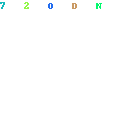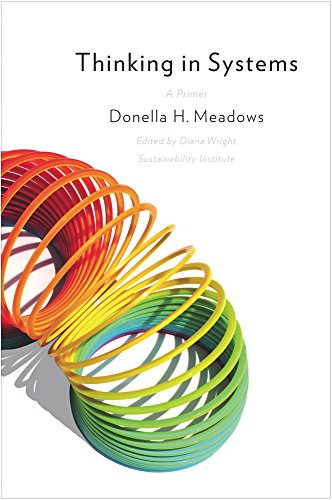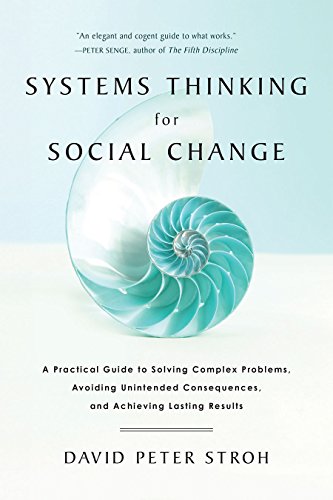Finding the best systems theory suitable for your needs isnt easy. With hundreds of choices can distract you. Knowing whats bad and whats good can be something of a minefield. In this article, weve done the hard work for you.
Reviews
1. On Complexity (Advances in Systems Theory, Complexity, and the Human Sciences)
Description
In this volume of key essays Morin turns his attention to the technical and philosophical underpinnings of complexity theory and applies it to a wide-ranging number of issues. These essays will certainly stimulate the critical debate within complexity circles, but is also essential reading for anybody interested in our complex world and how to live in it.Contents: Foreword: Edgar Morin's Path of Complexity, Alfonso Montuori. BLIND INTELLIGENCE. Becoming Aware. The Pathology of Knowing, Blind Intelligence. The Need for Complex Thought. COMPLEX PATTERN AND DESIGN. Indo-America. Systems Theory. Open Systems. Information/Organization. Organization. Self-organization. Complexity. Subject and Object. Coherence and Epistemological Opening. Scienza Nuova. For a Unity of Science. Integration of the Realities Banished by Classical Science. Beyond Classical Either/Or Alternatives. The Paradigmatic Turning Point. THE PARADIGM OF COMPLEXITY. The Paradigm of Simplicity. Order and Disorder in the Universe. Self-organization. Autonomy. Complexity and completeness. Reason, rationality and rationalization. The Necessity of Macro-concepts. Three Principles. Toward Complexity. COMPLEXITY AND ACTION. Action Is Also a Wager. Action Escapes our Intentions. The Non-trivial Machine. Preparing for the Unexpected. COMPLEXITY AND THE ENTERPRISE. Three Causalities. From Self-organization to Self-eco-organization. To Live and Make a Deal with Disorder. Strategy, Program, and Organization. Complementary and Antagonistic Relations. The Necessity for a Lived Solidarity. ON THE NOTION OF THE SUBJECT, translated by Sean M. Kelly. THE EPISTEMOLOGY OF COMPLEXITY, translated by Sean M. Kelly. Appendix 1: The Concept of System, translated by Sean M. Kelly. Appendix 2: A New Science of Autonomy. Notes. Author Index
2. Thinking in Systems: A Primer
Feature
Ships from VermontDescription
In the years following her role as the lead author of the international bestseller, Limits to Growththe first book to show the consequences of unchecked growth on a finite planet Donella Meadows remained a pioneer of environmental and social analysis until her untimely death in 2001.
Thinking in Systems, is a concise and crucial book offering insight for problem solving on scales ranging from the personal to the global. Edited by the Sustainability Institutes Diana Wright, this essential primer brings systems thinking out of the realm of computers and equations and into the tangible world, showing readers how to develop the systems-thinking skills that thought leaders across the globe consider critical for 21st-century life.
Some of the biggest problems facing the worldwar, hunger, poverty, and environmental degradationare essentially system failures. They cannot be solved by fixing one piece in isolation from the others, because even seemingly minor details have enormous power to undermine the best efforts of too-narrow thinking.
While readers will learn the conceptual tools and methods of systems thinking, the heart of the book is grander than methodology. Donella Meadows was known as much for nurturing positive outcomes as she was for delving into the science behind global dilemmas. She reminds readers to pay attention to what is important, not just what is quantifiable, to stay humble, and to stay a learner.
In a world growing ever more complicated, crowded, and interdependent, Thinking in Systems helps readers avoid confusion and helplessness, the first step toward finding proactive and effective solutions.
3. A First Course In Chaotic Dynamical Systems: Theory And Experiment (Studies in Nonlinearity)
Feature
Product Details: 302 pagesPublisher: Westview Press (October 21, 1992)
Language: English
ISBN-10: 0201554062, ISBN-13: 978-0201554069
Product Dimensions: 9.5 x 6.5 x 1 inches, Shipping Weight: 1.6 pounds
Description
4. Systems Thinking For Social Change: A Practical Guide to Solving Complex Problems, Avoiding Unintended Consequences, and Achieving Lasting Results
Feature
Ships from VermontDescription
Donors, leaders of nonprofits, and public policy makers usually have the best of intentions to serve society and improve social conditions. But often their solutions fall far short of what they want to accomplish and what is truly needed. Moreover, the answers they propose and fund often produce the opposite of what they want over time. We end up with temporary shelters that increase homelessness, drug busts that increase drug-related crime, or food aid that increases starvation.
How do these unintended consequences come about and how can we avoid them? By applying conventional thinking to complex social problems, we often perpetuate the very problems we try so hard to solve, but it is possible to think differently, and get different results.
Systems Thinking for Social Change enables readers to contribute more effectively to society by helping them understand what systems thinking is and why it is so important in their work. It also gives concrete guidance on how to incorporate systems thinking in problem solving, decision making, and strategic planning without becoming a technical expert.
Systems thinking leader David Stroh walks readers through techniques he has used to help people improve their efforts to end homelessness, improve public health, strengthen education, design a system for early childhood development, protect child welfare, develop rural economies, facilitate the reentry of formerly incarcerated people into society, resolve identity-based conflicts, and more.
The result is a highly readable, effective guide to understanding systems and using that knowledge to get the results you want.
5. The Eight Concepts of Bowen Theory
Description
"The Eight Concepts" is a clear and concise description of the basic concepts of Bowen family system theory. Beginning with the fundamental concept of the nuclear family as the emotional unit, the other concepts -- differentiation of self scale, triangles, cutoff, family projection process, multigenerational transmission process, sibling position, and emotional processes of society -- are explained as they evolve out of the fundamental concept of the emotional unit. The emphasis is clarity of presentation and purity of presentation of theory. Numerous citations to the writings of Dr. Bowen and experts who studied under Dr. Bowen are used to present the theory in as pure a form as possible in a short and easy-to-read book. The special sections in each chapter for parents, coaches and leaders bring each concept home for different roles readers bring to the book. An index is included.6. The Systems View of Life: A Unifying Vision
Feature
Cambridge University PressDescription
Over the past thirty years, a new systemic conception of life has emerged at the forefront of science. New emphasis has been given to complexity, networks, and patterns of organisation, leading to a novel kind of 'systemic' thinking. This volume integrates the ideas, models, and theories underlying the systems view of life into a single coherent framework. Taking a broad sweep through history and across scientific disciplines, the authors examine the appearance of key concepts such as autopoiesis, dissipative structures, social networks, and a systemic understanding of evolution. The implications of the systems view of life for health care, management, and our global ecological and economic crises are also discussed. Written primarily for undergraduates, it is also essential reading for graduate students and researchers interested in understanding the new systemic conception of life and its implications for a broad range of professions - from economics and politics to medicine, psychology and law.7. Systems Theory and Family Therapy: A Primer
Feature
Systems Theory and Family Therapy A PrimerDescription
Systems Theory and Family Therapy describes the basic concepts of systems theory and its application in family therapy in a clear, understandable manner with many illustrations drawn from clinical practice. This edition provides a revised and updated version of the original, that simplifies a complex area of study, enabling students to learn the subject more easily without being overwhelmed by the language normally employed in presenting these subjects. The authors discuss the distinctions between modernism and postmodernism as well as first-order and second-order cybernetics. They also include discussions of constructivism and social constructionism, as well as the ramifications of these perspectives for the theory and practice of family therapy.8. General System Theory: Foundations, Development, Applications
Feature
General System Theory Foundations Development ApplicationsDescription
The classic book on a major modern theory
Bertalanffys selected writings on his theory of laws applicable to virtually every scientific field. This conceptual approach has had a profound impact on biology, economics, psychology, and demography, with new relevancies today. The new forewordby University of Vienna system theory professor, Wolfgang Hofkirchner, and Centre for Systems Philosophy director, David Rousseau, discusses the theorys contemporary applications.9. World-Systems Analysis: An Introduction
Feature
Used Book in Good ConditionDescription
Wallerstein explains the defining characteristics of world-systems analysis: its emphasis on world-systems rather than nation-states, on the need to consider historical processes as they unfold over long periods of time, and on combining within a single analytical framework bodies of knowledge usually viewed as distinct from one anothersuch as history, political science, economics, and sociology. He describes the world-system as a social reality comprised of interconnected nations, firms, households, classes, and identity groups of all kinds. He identifies and highlights the significance of the key moments in the evolution of the modern world-system: the development of a capitalist world-economy in the sixteenth-century, the beginning of two centuries of liberal centrism in the French Revolution of 1789, and the undermining of that centrism in the global revolts of 1968. Intended for general readers, students, and experienced practitioners alike, this book presents a complete overview of world-systems analysis by its original architect.
10. Systems Theory in Action: Applications to Individual, Couple, and Family Therapy
Feature
Systems Theory in ActionDescription
"Smith-Acua illuminates the structural hierarchy, roles, and boundaries that give a system structure. The relationship between parts and wholes is both simple and profound, and particularly important in looking at systems structure. These morsels of wisdom are good examples of Smith-Acua's grace as a systems theory tour guide: one moment she's digging deeper into the nuances among the theories, the next moment she's simplifying without dumbing down, but in a manner that is enormously liberating. We enjoy the fun, full, and informed journey with her." Frank S. Pittman III, MD
A practical presentation of systems theory as
a fundamental model for clinical practice
Valuable for seasoned mental health professionals as well as those in training, Systems Theory in Action presents systems theorythe unifying principles surrounding the organization and functioning of systemsas it applies to individual, couples, and family therapy.
This innovative book explores systems theory as an effective model for general mental health practice. It examines the role systems theory can play, specifically in understanding clients' presenting problems in context, within the various systems and subsystems in which the problems are embedded.
Filled with realistic clinical stories illustrating relevant concepts that tie theory to technique, Systems Theory in Action takes an in-depth look at:
-
Systems theory as a solid guide through the dynamic process of psychotherapy
-
The multilayered value of observing human interactions through a systems view
-
Systemic thinking, its core components, and how it serves to reveal a "big picture" view of clients and their presenting problems
Systems Theory in Action is a unique contribution to the field, translating the technical terminology of general systems thinking into common, everyday language.
11. Introduction to Systems Theory
Feature
Used Book in Good ConditionDescription
Niklas Luhmann ranks as one of the most important sociologists and social theorists of the twentieth century. Through his many books he developed a highly original form of systems theory that has been hugely influential in a wide variety of disciplines.
In Introduction to Systems Theory, Luhmann explains the key ideas of general and sociological systems theory and supplies a wealth of examples to illustrate his approach. The book offers a wide range of concepts and theorems that can be applied to politics and the economy, religion and science, art and education, organization and the family. Moreover, Luhmanns ideas address important contemporary issues in such diverse fields as cognitive science, ecology, and the study of social movements.
This book provides all the necessary resources for readers to work through the foundations of systems theory no other work by Luhmann is as clear and accessible as this. There is also much here that will be of great interest to more advanced scholars and practitioners in sociology and the social sciences.
12. Clinical Applications of Bowen Family Systems Theory (Haworth Marriage and the Family)
Feature
Used Book in Good ConditionDescription
One look inside Clinical Applications of Bowen Family Systems Theory, and youll see that your most current clinical dilemmas are not as difficult to solve as you think. Youll find plenty of information to assist you in treating a vast audience of populations--the elderly, college students, troubled couples, remarried families, and children with severe medical problems. Youll also find that youre able to apply the Bowen systems theory to nearly every clinical situation--emotional dysfunction in children, alcoholism, incest, divorce, depression, phobias, and obsessive-compulsive disorders.Clinical Applications of Bowen Family Systems Theory is an ideal companion for family therapists, clinical psychologists, clinical social workers, psychiatrists, psychiatric nurses, and counselors. Youll find your working comprehension of Murray Bowens work will grow, and youll become more adept at applying what you read in real-life clinical situations, especially in these related areas:- family systems assessment based on the Bowen Theory
- marital fusion and differentiation
- bridging emotional cut-off from a former spouse
- dealing with a child-focused divorce
- case studies of alcoholism and family systemsClinical Applications of Bowen Family Systems Theory is the first book to collect, illustrate, and walk you through a full application of this highly effective treatment method in any number of clinical settings. Both beginning and experienced therapists will find interesting reading in the history of the theory, and the result will be interested clients who begin to create functional, thriving personal histories for themselves.












